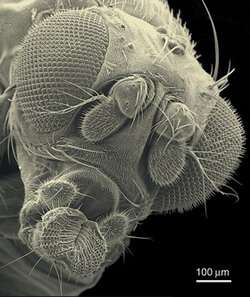Evolutionary First: Parasite Reaches Beyond Host to Play Havoc with Others' Sex Lives

Scientists revealed today that a prolific parasite is helping shape the destiny of a species it does not even infect. The complex relationship between the parasite, its host, and the unconnected species is the first known example of evolutionary pressure from such a remote source.
Five years ago, University of Rochester scientists linked the bacterial parasite, Wolbachia, to the separation of a single wasp species into two distinct species. Now, researchers have found that this same parasite in fruit flies is not only meddling with the sexual behavior of its host, but may be causing a change in the sexual behavior of a species that is not infected.
"Darwin's model of evolution is based on genetic variation that causes differences in survival and reproduction," says John Jaenike, professor of biology. "However, this apparently simple scheme can operate in very complex and indirect ways."
Several years ago, Jaenike found that two very closely related species of fly differed in that one was thoroughly infected with Wolbachia while the other was Wolbachia-free. Each species resided in coniferous forests on opposite sides of North America, and, knowing that Wolbachia can affect reproductive isolation between species, he wondered whether the two species actually met each other in nature. A stretch of forest in Canada physically connected the eastern and western communities, so he set out to discover whether these two species' territories overlapped.
In June of 2002, Jaenike sent two under-graduate students on a summer-long camping trip across the northern United States and Canada. Armed only with nets, store-bought mushrooms, and Fed Ex boxes, Chad Cornish and Paul Gibas camped at designated spots, set out the mushrooms, collected the flies that gathered on them, and mailed them back to Rochester.
"On the whole it went off without a hitch, except one package was held up in customs and we received a big box of dead flies," says Jaenike.
As the boxes came in, Jaenike was gratified to find that as Cornish and Gibas worked their way through Canada, a region of geographic overlap between the two species emerged. But he wasn't expecting what came next.
The mating behavior of females of the uninfected species in overlap zone had changed dramatically. The flies were put into large glass boxes where hundreds of both species could mingle and mate. The males of both species mated with females from both species, and the females from the infected species mated with both kinds of males. But the females from the uninfected species refused to mate with any but their own kind.
And most importantly, these females had become so picky about their mates that they were beginning to shun some males of their own species.
"In that area in Canada where the two species overlap, the uninfected females' mating practices have changed dramatically," says Jaenike. "When we mixed males from the west coast with the females from the same species in central Canada, the females would often refuse to mate. This could be a first step on the road to the uninfected species splitting into two new, individual species."
In 2000, a colleague of Jaenike's, Professor of Biology Jack Werren, showed that Wolbachia's species-splitting effect on its host came before any other evolutionary splitting pressure. Jaenike and his colleagues have now presented evidence that this same parasite might push a completely uninfected species down the same road—the first time such a convoluted evolutionary pressure has been documented.
Wolbachia, which infects 20 percent of all insect species, propagates itself by actively preventing uninfected females from reproducing. The parasite somehow alters the sperm of its male host, rendering matings between infected males and uninfected females infertile. If, however, the male mates with an infected female, their offspring are viable, helping spread the infection to all members of the species.
In Jaenike's flies, the uninfected females refused the infected males' advances presumably because the subsequent offspring would be unable to survive—a terrible price to pay for all the effort of producing young.
"Those females willing to mate with infected mates would produce no young, while the females that only mated with their own, uninfected males, would pass on their genes," says Jaenike. "Eventually, the genes from all those uninfected females that were willing to mate indiscriminately would be weeded right out of the population."
The females have become so selective that they often won't mate with their own species if the male is from another area.
"We found that the central Canadian females often won't mate with the males from the west-coast population, even though they're from the species and they're all uninfected," says Jaenike. "Those central Canada females have apparently become so selective that the slight differences that characterize males from other populations make them unacceptable. It's interesting that the west-cost females, which never encounter males of the infected species, are much less choosy when it comes to mate choice. It's even possible that this Wolbachia-induced behavioral isolation could contribute to splitting this species, even though Wolbachia doesn't infect it at all."
Jaenike continues his research into the way Wolbachia exploits the rules of evolution and its impact on host species. Given the intricacies of the evolutionary process, it's hard to predict what might turn up.
This research appears in the October 10 issue of PLoS: Biology, and was funded by the National Science Foundation.
Source: University of RochesterUniversity of Rochester















